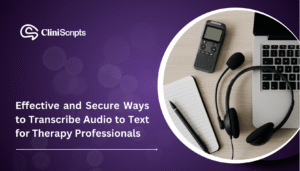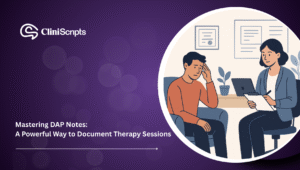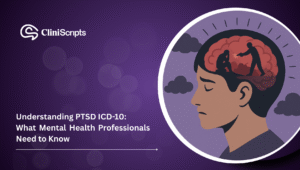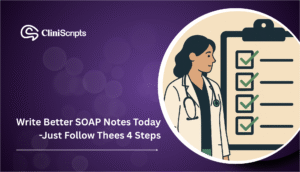Medically Reviewed: Dr Alex Evans
Image Credit: Canva
[ez-toc]
Key Takeaways
- AI Makes Mental Health Care Awesome: Imagine super-smart helpers for doctors that take notes and make things smoother! That’s what AI, or Artificial Intelligence, does for mental health professionals.
- No More Doodling Sounds! AI tools can listen to therapy sessions and turn all that talking into written words. This frees up doctors’ time for the most important part: helping you!
- Getting the Most Out of Therapy: Just like a super-memory friend, AI can analyze therapy notes and suggest things to talk about next. This keeps sessions focused and helps you get the most out of your time with a doctor.
Introduction
Do you feel “good” when you help people? Do you help people to feel good or because it is a good thing to do, and the feeling is a bonus? And, do you help people to feel good about themselves? Whichever way you slice it, people benefit by your actions. Now… what if… you also had some awesome tech in your superhero utility belt! How much better would that feel? For you, and for the recipient of your act of kindness. Feelings are the raw dough with which you bake your mental health pie. And Artificial Intelligence, or AI for short, is what our bring in your utility belt in mental health care adventure.
AI is like a super-powered computer whiz that helps therapists and doctors in tons of ways. Here’s the cool stuff:
- Turbocharged Typing: Mountains of paperwork/! Ka-Pow!! Gone! AI can listen to conversations and transcribe them extremely fast, freeing up our time for increased bonding and interaction with patients.
- Therapy Sidekick: Feeling stuck? AI can help therapists come up with questions and activities to keep sessions exciting and helpful.
These are only a couple of examples of how AI is making mental health care even more productive. Want to learn how to use it in your practice? Stay tuned for more tips coming soon!
Super Smart Computers Helping With Feelings!
Have you ever heard of AI? It stands for Artificial Intelligence or, in layman speak, super smart computers that can learn and help us perform more efficiently. AI can be a big friend for people who need help resolving their feelings and returning to a healthier mental state!
Making Life Easier for Doctors
Let’s take the case of hypothetical mental health professional who has to conduct several conversations every day with his patients and talk about their feelings. Making notes during and/or after each conversation can take up a lot of time, and be a tedious task. But with AI, these extremely “clever” programs can make the computer listen to the conversations and turn them into written notes. This frees up more time for the doctor to continue to focus on helping more people.
Just Like Magic!
These AI helpers are like a bit like your favourite telephone exchange operators from the 1950s! And like a good gossip girl, they can listen to everything and retain it all and then write it down very quickly, without missing any of the details or the nuances. j But jokes aside, the gossip girl algorithms provide exceptional support to mental health professionals by ensuring that nothing of significance gets left unnoticed and that theT doctors are able to provide the best help possible.
Supercharge Therapy Sessions with Artificial Intelligence!
Looking at things from the patient’s perspective (called “POV” by Gen Z and Gen Alpha), talking about feelings can be tricky at the best of times; and in therapy, almost always very difficult to navigate. As a therapist, you might sometimes not even know where to start, much less where to take it! Fortunately, we live in a day and age where we have super smart computers the likes of which no one has ever seen before in history (sorry! I just had to do it) powered by a stack of algorithms we collectively call Artificial Intelligence, and these machines along with this man-made intelligence can really help navigate this conversation.
These clever devices can help you review the notes from your patient’s past therapy sessions and suggest new ideas to talk with them about in the upcoming session. Managed this way, therapy sessions can be acutely focused and helpful; simply put, it’s like having your own “Jeeves” laying out your clothes for you for the evening soiree, complete with the cravat, cufflinks, shoes and stick! It misses nothing; nothing!
Wait, that’s not it; there’s more! You see, therapists come in two flavors: psychologists and psychotherapists. They both help people, but in slightly different ways.
Helping Therapists Be Detectives and Coaches
Psychologists are like detectives, figuring out what’s going on. AI can help them by looking at lots of information from different patients and identifying patterns. Psychotherapists, on the other hand, work with people’s feelings and help them return to or build towards a state of feeling better, a bit like a coach strengthening old skills or teaching new ones. AI can help them by keeping track of progress and suggesting new ways to help.
So, how can therapists get these brainy computers on their team? Here’s a super simple plan:
Your Step-by-Step Guide to Getting a Artificial Intelligence Pinch-Hitter to bat for you
- Figure Out What Needs a Boost: Is taking notes a drag? Maybe AI can help write things down!
- Pick the Perfect Partner: There are all sorts of AI tools out there, find one that fits your needs!
- Teach Your Team: Make sure everyone knows how to use these AI tools and devices.
- Try Before You Buy: Don’t jump right in, give the AI a test run first!
- Ask Everyone: See what therapists and patients think about the Artificial Intelligence solution after a try.
- Tweak and Tune: Based on everyone’s feedback, keep improving the AI to work even better!
- Keep it Secret, Keep it Safe: Make sure the AI keeps all your information private, just like a trusted confidante, not Gossip Girl!
Conclusion: A Brighter Future for Mental Health
Using AI in therapy isn’t just about fancy gadgets and software code, it’s about improving lives of mental health care-providers – and their patients! With AI as a teammate, therapists can focus on what they do best: helping people “feel good” again! So, whether it’s taking notes, reminding you of helpful tips, or just keeping things organized, AI is paving the way for a seriously awesome future for mental health care. By working together, therapists and AI can make sure everyone gets the help they need to thrive!
MarkiTech.AI is a team of over 50 software engineers, data scientists and clinicians plus other health practitioners who have developed over 40 digital health solutions in the last 10 years such as SenSights.AI, Veyetals.comand CliniScripts.com which focus on helping older adults and their caregivers like family, physicians, nurses etc., age in place, reduce costs and improve revenue opportunities.







